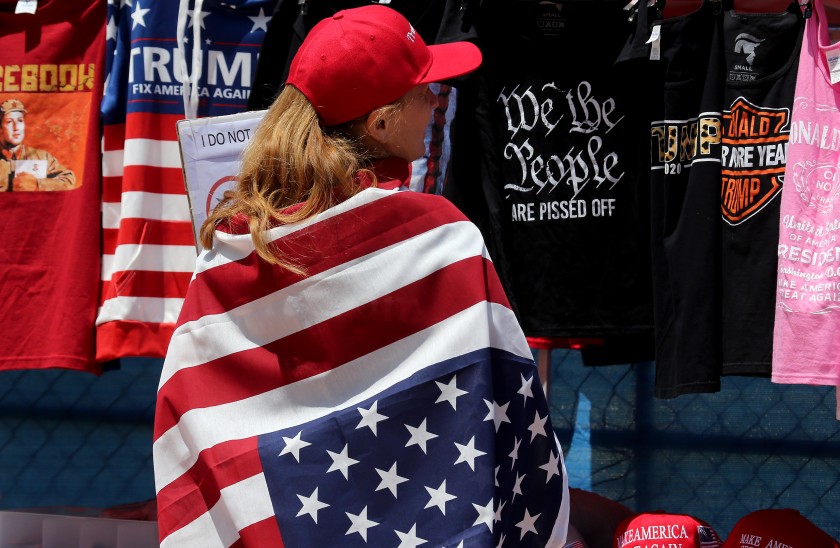Vaccine ‘passports’ become battle cry for COVID conspiracies
It’s a simple enough concept as the world begins its recovery from the pandemic: storing COVID-19 vaccination records online so they can be easily accessed on smartphones and other devices.
Backers see it as a much more efficient proof of vaccination than the paper slips issued by the Centers for Disease Control and Prevention.
But these so-called vaccine passports have faced an unexpected backlash in some corners of America, where distrust of government and wild social media claims during the pandemic have sparked anger and protests. In some cases, the opposition has been led by people who last year battled against mandatory mask wearing and other COVID-19 restrictions imposed by the government.
The intensity of the debate was evident Tuesday in Orange County, where hundreds of protesters descended on a Board of Supervisors meeting to oppose a pilot “passport” program. Despite assurances from officials, some opponents insisted the passports could be used to “track” people and reveal private healthcare information, and enable the county to favor residents who chose to get vaccinated.
“I will not be bullied, coerced, harassed in any way, shape or form … into participating into a massive human experiment in order to fit in,” one woman told the board.
County officials repeatedly rejected the claims and expressed frustration at how they have spread.
“This is not about vaccines; this is about something else,” Supervisor Katrina Foley said. “We should not cater to people who are spreading misinformation and lies.”
Orange County — which has for years tried to shake its reputation as a haven for political extremism — was a hotbed of opposition to mask rules and other government-imposed restrictions last year, with Gov. Gavin Newsom sparring with some officials over temporary plan to close beaches.
And while cases of COVID-19 have eased considerably in the county and the rest of California, grass-roots skepticism about masks, vaccines and government remains a looming force. Some protesters Tuesday were hostile toward a Times photographer because he was wearing a mask.
Supporters of the vaccine passport concept, including some in the world of public health, have spent weeks trying to assuage the public’s concerns, often to mixed results.
“What is political about masks? What is political about a vaccine passport?” Dr. John Swartzberg, a UC Berkeley infectious-disease expert, said Tuesday. “It’s only if you choose to make it political.”
Swartzberg said that many of the arguments in opposition to the passports are specious, adding that even if government entities don’t institute them, they will probably “grow organically out of society and businesses” — particularly in sectors such as air travel in which people will want the peace of mind of knowing that their fellow passengers have been vaccinated.
Opponents would still have the freedom to choose not to participate in organizations or businesses that require some form of records, he said, noting that digitized health records have been common for years. Similarly, inoculations against other infectious diseases have long been required for certain forms of school and travel.
But as more cities and counties consider the digitized records, the debate is unlikely to wane anytime soon. Experts have said employers, colleges and other sectors will probably institute some form of vaccination requirements in the near future. Already, at least one person in California has been arrested and charged with selling fake COVID-19 vaccination cards.
But even in the public health world, there are nuanced views about passports and the prospect of tying vaccinations to some activities.
“I understand why it’s becoming so politicized,” Dr. Aaron Kheriaty, director of the medical ethics program at UC Irvine and a member of Orange County’s vaccine task force, said Tuesday. “If private entities start developing policies that deploy that tool as a gatekeeper, then I think the fears and concerns that many people are trying to express right now actually will be borne out.”
Kheriaty said the county has done a good job of vaccinating those who need it most — the elderly and residents with underlying health conditions — and said those who remain unvaccinated may have religious, health or other personal reasons for declining a shot.
Requiring vaccines — whether at a government level or simply for entry to places such as restaurants, airplanes, grocery stores and schools — could put those people at a disadvantage, he said.
“I would consider blocking off access to otherwise ordinarily available public activities as a fairly heavy-handed form of coercion,” he said. “I’m ‘pro’ let the person decide. Let the individual weigh their own risks and benefits.”

A woman draped in an American flag browses Donald Trump memorabilia and other items outside the Hall of Administration in Santa Ana on Tuesday.
(Luis Sinco / Los Angeles Times)
The debate around vaccine passports is not limited to Orange County. When the state in April announced that some businesses could hold larger events if they verify that attendees are vaccinated, some said it was akin to an incentive.
But at Tuesday’s Board of Supervisors meeting, the discussions extended beyond the passports to various conspiracies about vaccines.
Several speakers at the meeting compared vaccines to “gene therapy” and said the proposed passport was akin to the yellow stars Nazis ordered Jews to wear as a means of identification.
Likening health protocols around vaccinations to the Holocaust “trivializes a horrific time in human history,” Peter Levi, regional director of the Anti-Defamation League in Orange County and Long Beach, responded in a statement. “Such political use of the Holocaust stops civil and rational discussion dead in its tracks.”
Images posted to social media showed that word of the protest had been circulating online and through fliers, describing Orange County as “the battleground of the nation.”
One protester Tuesday described the crowd as patriots and said he was there to make it clear that “America in general is not going to be OK with this.”
Behind him, scores of people chanted and waved signs and American flags. Elsewhere, a merchandise booth offered Donald Trump memorabilia for sale.
Inside the meeting hall, tensions reached a boiling point when Chairman Andrew Do proposed tabling the digital passports discussion in an attempt to quell distractions and refocus on the county’s vaccination efforts.
“The noise around this whole vaccine passport has reached the point where it’s becoming counterproductive,” Do said.
Supervisor Foley strongly opposed Do’s proposal to pause. The county’s economy is highly dependent on tourism, theme parks, sporting events and concert venues, she said, many of which sell tickets online. Digital proof of vaccination could be key to their ability to operate at maximum capacity.
“We are appeasing a very small faction of our community who actually are not going to get vaccinated. They’ve already told us they don’t believe in vaccines,” she said
Foley and other officials stressed that the digital vaccination records, which would include a QR Code for vaccine recipients who registered for appointments through the county’s Othena app, would provide an alternative to the paper cards issued by the CDC, which can be easily lost or destroyed.
After nearly four hours of public comment, the Board of Supervisors voted 4 to 1, with Foley dissenting, to pause any further work on digital record verification and QR Codes for the Othena app.
“The discussion continued to be one of invasion of privacy and abuse of government power,” Do said when he proposed the pause. “However large or small it is, it affects people — some of our residents — from getting vaccinated.”
According to The Times’ tracker, about 51% of Orange County residents have received at least one dose of a COVID-19 vaccine, and 38% are fully vaccinated. The numbers are about on par with the state, where 49% of residents have received at least one dose and 36% have been fully vaccinated. Nationwide, about 58% of adults have received at least one shot, according to the CDC.


